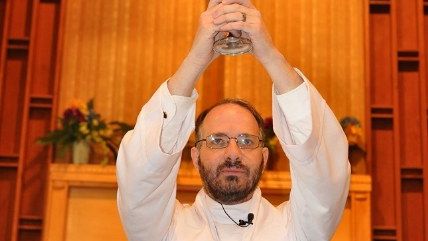Pastor Sues Michigan over Right to Administer Purely Private Marriages
Does the state have authority to control who may be married if they aren't seeking recognition or benefits?


What does it mean to "solemnize" a marriage, anyway? How a church or a minister approaches the word versus how the state of Michigan legally considers the term is the focus of a new lawsuit in the state.
Detroit Pastor Neil Patrick Carrick has celebrated the new year by filing a lawsuit against Michigan's governor and attorney general based on laws that declare that it's illegal for any person—both government clerk and private religious official—to "solemnize" a marriage that the state does not recognize. The penalty: a $500 fine.
These laws seem to assume that every marriage or wedding ceremony is for the purpose of getting legal recognition from the state. Carrick is challenging that concept, and Judge Judith Levy has ordered the state to respond this week and answer whether Michigan's laws allow "civil and criminal sanctions of persons who improperly solemnize marriages authorize the state to impose those sanctions when the ceremony is purely private in nature, and not intended to have legal effect?"
"Everybody who performs a wedding ceremony works as an agent of the state," Carrick told Reason when explaining the purpose of his lawsuit. The marriage process in Michigan requires citizens to get their paperwork from the state, bring in to either an appropriate official or a recognized religious official for the ceremony, and then return the appropriate documentation. But the laws also obligate those who solemnize private marriage ceremonies, like Carrick, to make sure the marriage is legal under state law. He had previously challenged a ban on solemnizing same-sex marriages.
Now that the Supreme Court has mandated recognition of same-sex marriages, the issue still exists. There are a number of reasons why couples (or more, for that matter) might want to seek religious and community recognition of their relationships without turning to the state to demand legal recognition. That's what Carrick is fighting for. And it's not necessarily just about people who want to get for the "sake" of being married. Some people want to declare their covenant to each other, to family, to members of the community, et cetera.
"It's moreso that they necessarily have to be part of the state system, but are not necessarily seeking state entitlements," Carrick says. "Participants in marriages aren't necessarily looking for the state to affirm their marriage."
One example Carrick provided to MLive in Michigan was of an elderly couple who decides they want to get married, but don't want to file for state recognition for fear the status change could interfere with post-retirement benefits. Can that couple be wed in holy matrimony without registering with the state? It seems like the answer should obviously be "yes," but Carrick is having to push and get a judge to order state officials to explain the law. When the state uses the word "solemnize," is it referring to the way religious or private people might invoke it, or does it mean the legal definition that includes intent to enter into an actual legal contract?
Carrick wants the state to explain which and thinks he'll win either way. If the state argues that it does have the authority to block private "solemnization" of marriages that don't comply with state law, even with no intent to register such marriages with the state, it would certainly seem to be a violation of the First Amendment rights of people to call themselves what they choose. If the state responds that they're referring to the legal term of "solemnization" and don't have the authority to prosecute ministers for private marriages that aren't recognized by state law (unless these couples attempt to file for legal recognition), then the law is clarified.
Carrick says he doesn't know if anybody has been prosecuted for actually violating the law. It would be tough to track, because it's considered a misdemeanor. What Carrick wants is to prevent a situation where prosecutors believe it's up to their discretion as to whether they can prosecute.
"If they don't tell the answer and a judge doesn't order it, a prosecutor can say it's up to the prosecutor to decide," Carrick says. "'It's my opinion—it's what I'm going to do.' Prosecutors have used [laws against cohabitation or adultery] to threaten people to get them to testify in hearings. They say, 'We are going to prosecute you on cohabitation or adultery parts of the law unless you testify.'" Carrick says he wants to make sure prosecutors can't use the vague wording of these laws to do the same to those who have marriages that aren't recognized by the state of Michigan.
Judge Levy has ordered both sides in the case to answer her question as to whether Michigan's marriage laws permit government authority over ceremonies that are "purely private" and don't seek state recognition or entitlements by January 8. Read Carrick's lawsuit here.


Show Comments (136)